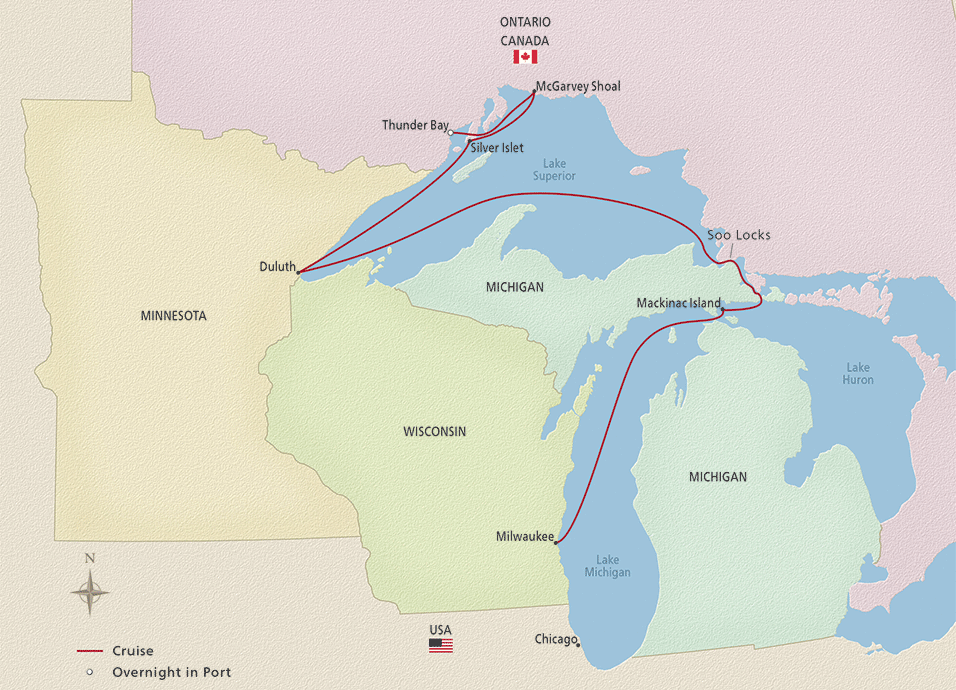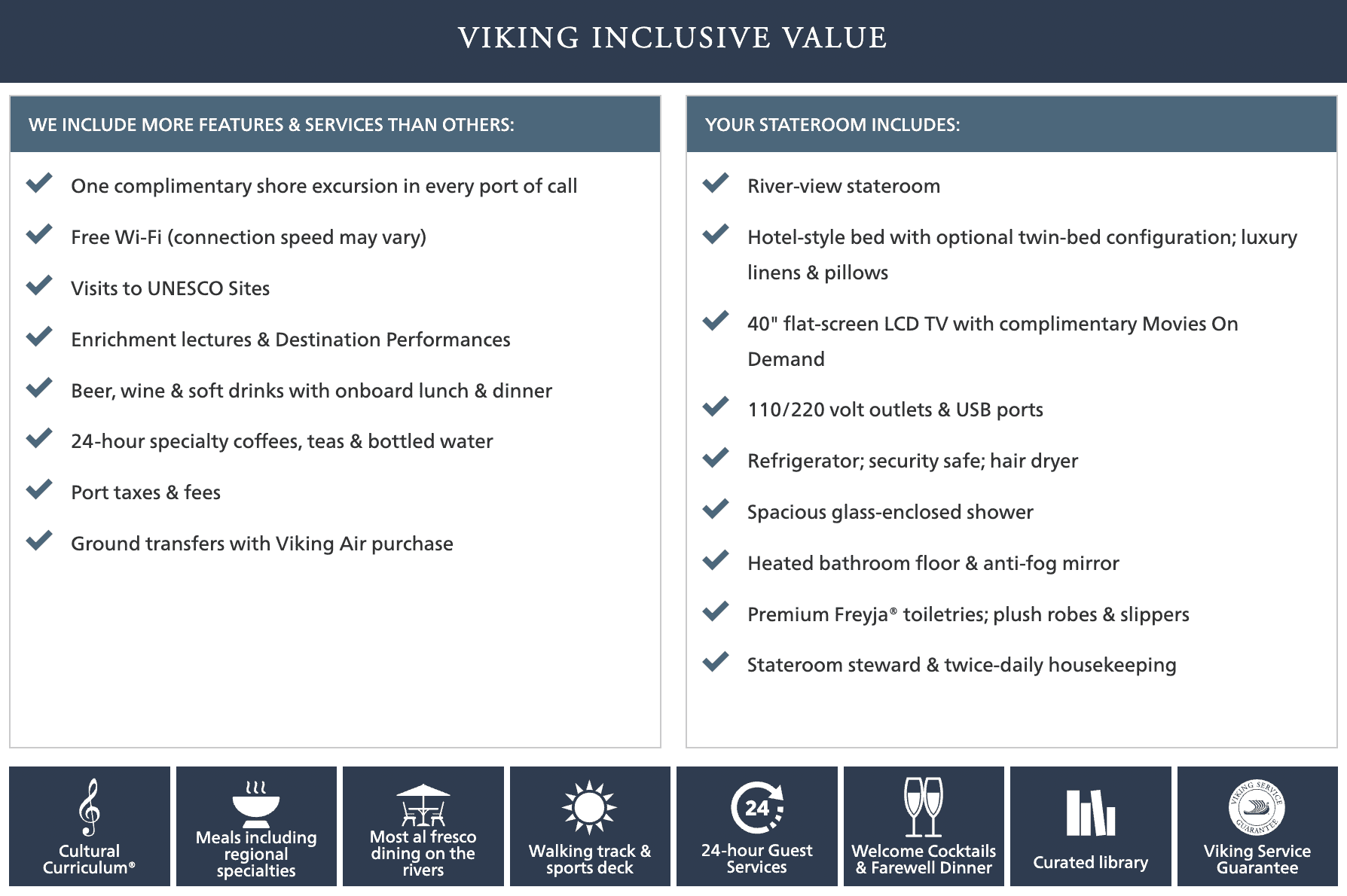Call us or email us if you have any questions.

From boreal forests to frontiers
Cross the width of Lake Superior between Duluth and the Soo Locks, exploring the Apostle Islands and Keweenaw Peninsula along the way. Hike along clifftop trails for sweeping views of the lake. Gain insight into the unique features and ecosystems of remote wilderness islands, and admire Kakabeka Falls, the “Niagara of the North.” Discover sea caves by kayak and step back in time as you stroll the quaint, car-free streets of Mackinac Island.
Thunder Bay, Canada / Milwaukee, United States
2024 Sailings from June to July, and on September
2025 Sailings from June to July, and on September
* Please check with us for dates & pricing
Cruise fare from $7,795.0 per person
* Please check with us for dates & pricing

Embark your ship and settle into your stateroom. Thunder Bay is known as “Canada’s Gateway to the West” for its location at the final navigational point on the Canadian side of Lake Superior. Originally founded as a fur trading post, a settlement was established in 1803 and Fort William was erected. In 1970, Fort William and neighboring Port Arthur were merged to form the City of Thunder Bay. Today, it is one of Ontario’s most vibrant cities and a center of art and culture. Its Waterfront District is beloved for its views across the bay of the Sleeping Giant, a long line of mesas that resemble a giant lying on its back.
Thunder Bay is home to stunning scenery amid pristine wilderness, with water trails that weave their way through boreal forests. For centuries, these waters were the trade routes of the Indigenous Peoples who resided here, who paddled through towns and villages to trade fur and other goods. Today, the region can still be explored by canoe. Thunder Bay also lies in the heart of amethyst country; these semi-precious stones can be found along the north shore of Lake Superior. Local gift shops and jewelers offer a range of polished amethyst pieces for visitors to buy.
McGarvey Shoal is located in the Lake Superior North Shore Inside Passage. More than a shallow reef, it is the peak of an underwater mountain that rises from a depth of 270 feet to three feet below the water’s surface. The shoal is the site of a famous shipwreck, the Gunilda. The luxury steam yacht foundered here in 1911 after its owner refused to hire a pilot to navigate the treacherous waters of the Schreiber Channel. The crew and passengers safely disembarked, but efforts to dislodge Gunildia caused her to sink; today, she is preserved 266 feet below the lake’s surface.
Silver Islet sits on the southern edge of the Sibley Peninsula at the mouth of Thunder Bay. Nearby Sleeping Giant Provincial Park attracts outdoor enthusiasts year-round with its diverse wildlife and many miles of hiking trails that lead to spectacular views of the Canadian Shield landscape. Less than a mile from its shores are the remnants of an abandoned silver mine. Located 1,200 feet below Lake Superior, this unique underwater mine was the world’s largest and most valuable silver mine, producing the modern-day equivalent of $78 million before flooding in 1884.
Duluth was named for French explorer Daniel Greysolon, Sieur du Lhut, who explored the St. Louis River in 1679. In 1808, famed merchant John Jacob Astor established the American Fur Company. Copper and iron ore mining swelled the population in the 1850s, while construction of channels and locks to the east allowed larger ships to access the city. Today, Duluth celebrates its history and culture with a wide array of museums and landmarks, including its famed Aerial Lift Bridge spanning the Duluth ship canal.
The Soo Locks is a series of parallel locks that make river travel between Lake Superior and Lake Huron possible, thereby linking Superior to the lower Great Lakes and the Atlantic. Opened in 1855 to allow ships to bypass the river’s 21-foot fall over roiling rapids, this innovative lock system—along with the Erie Canal built 30 years prior—was one of the great engineering projects of its day. Today, it guides ships past the twin cities of Sault Ste. Marie in Ontario and Sault Ste. Marie in Michigan; its bridge crosses over the Soo Locks, connecting the two cities.
Steeped in the charms of simpler times, Mackinac Island is a gem of the Great Lakes. Located in the Straits of Mackinac where Michigan’s upper and lower peninsulas are closest and Lakes Huron and Michigan meet, this bucolic haven preserves gilded Victorian-era treasures along car-free streets traversed by horse-drawn carriages. The perimeter road is the only state highway in the US that does not permit motor vehicles. More than 80% of Mackinac is protected as a state park, from its Greek Revival Grand Hotel and British-built Fort Mackinac to its preserved wilderness areas.
Milwaukee was first settled by Europeans in 1818, when French-Canadian fur trader Solomon Juneau arrived. German, Polish and Eastern European immigrants followed, bringing with them a long tradition of beer brewing. For several decades in the 20th century, Milwaukee became the world’s most prolific beer producer. Today, the city is a vibrant center of art, history and culture. The RiverWalk, a pedestrian walkway along the Milwaukee, is a popular spot for enjoying relaxing strolls or viewing public art installations. After breakfast, disembark your ship and journey home.
* One shore excursion included per port; all others available at an extra charge.